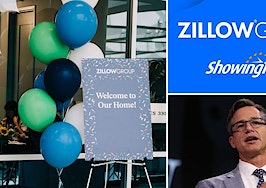It was nearly two in the morning when I realized I had a problem.
I had just woken up to the sound of my young baby crying. But when I glanced at my phone to see the time, I noticed instead notifications from the Clubhouse app, still popping up on my home screen despite it being the middle of the night.
Thirty-two people, one notification announced, “are talking about ‘breakfast with winners.’ Tap to listen in!”
I did not tap to listen in.
The moment was the culmination of days of research I had been doing ever since my editor asked me to dive into Clubhouse, which has quickly become the hottest new app that everyone in real estate is discussing. The app allows people to join audio-only conversations in virtual “rooms.” The experience is similar to a large Zoom call, or a virtual conference like ones Inman has put on over the last year, except without a live video feed.
Clubhouse launched in early 2020, but because users need an invitation to join it was initially limited mostly to Bay Area techie-types. The app went mainstream in late 2020, when invitations suddenly became much easier to find.
I joined Clubhouse in mid January. And I’ll admit for the first month the app gradually made me crazy. The combination of too much information and not enough substance was just maddening. I was prepared to dismiss the app until, finally, this week when I guess you could say I finally got it. Here’s what happened.
Clubhouse becomes background noise
After I signed up for Clubhouse I quickly followed around 300 people — many of them in real estate — then started dropping into rooms to listen in. The first one included a few dozen people and was about entrepreneurs. How did I know it was about entrepreneurs? Well, because seemingly every sentence included the word “entrepreneur.” This went on for over an hour, when I had something else to do, so I logged off.
It was a disappointing experience because I had initially thought of my Clubhouse assignment as a way to gather useful ideas that I could pass on to Inman readers. But that first conversation was all platitudes and corporate-speak. The only thing I walked away with was a sense of wonder at how so many people had so much free time to shoot the breeze.
Still, I pressed on. Over the following days, I dropped into rooms with names like “2021 Real Estate Trends, Traps and Strategy,” and “Real Estate Distilled — Are you thirsty for knowledge.”
Some of these conversations were great. Even if they weren’t always breaking new ground, the rooms that kept conversations concise and specific seemed like a good place to get a sense of what’s going on in various local markets, or to refresh basic skills.
Unfortunately though, very soon after signing up, Clubhouse turned my phone into a fire hose of notifications. At literally every moment I glanced at my phone, new notifications were streaming in, inviting me to find out if “you’re an influencer just because you call yourself one,” and how to make “massive passive income w/ land 💰.”
Occasionally these notifications were great. They let me tap into rooms featuring Glenn Sanford, founder of eXp Realty, and Marc Andreessen, the famous venture capitalist whose firm has backed companies such as Airbnb and Divvy Homes. I wouldn’t exactly call all of these conversations essential listening, but they were interesting.
But over time the more notifications I got the less I was able to find substantive conversations. Clubhouse seemed to scream for my attention at all hours of the day and night. It was overwhelming and Clubhouse was driving me insane — which is not something I’ve ever experienced with another app.
Others have pointed out this issue as well:
ok officially annoyed at clubhouse notification density
— alex 🏴☠️🇺🇸 (@alex) February 11, 2021
The other frustrating thing about many of the rooms I joined is that they seemed to go on forever.
There were many times when I joined a room, left, and then discovered it was still going an hour, or multiple hours, later. One friend told me she saw a conversation drag on for six hours. Others complained (perhaps somewhat, but not entirely, facetiously) about even longer conversations.
Clubhouse was a mistake. It’s supercharging discourse to new extremes of joblessness. All of these 8 hour rooms repeating the same points over and over again, then the room ends and a new room dissects the old room. It’s all too much
— Jason Okundaye (@jasebyjason) January 13, 2021
Look, if you have six hours a day to sit around chatting on an app, congratulations. I definitely envy people who have that amount of freedom with their time.
But for me, the endlessness notification stream hyping meandering conversations was just too much. And so without even realizing it at first, I started paying less and less attention to Clubhouse. From the precipice of insanity, I backed away and before long I was treating the app as background noise.
The notifications were still piling up, but I hardly even saw them.
But there were problems with that as well. Case in point: In early February, real estate and sales guru Grant Cardone apparently discussed joining eXp Realty with Sanford on Clubhouse. I may well have received a notification for that talk, but, if so, it was buried in a multitude of other notifications and I missed the conversation and had to scramble to confirm what was going.
How I learned to stop worrying and love the Club
After the Cardone-eXp news, I was ready to write off Clubhouse. I knew a lot of people liked it, but too many of the sessions I dropped into seemed to be dominated by people trying to act like influencers without offering much substance. Someone told me to use hashtags on Instagram years ago at Inman Connect, for example; listening to that advice again, ad nauseam on Clubhouse, just wasn’t a valuable use of my time.
And the one time there was something I needed to hear, I missed it.
But then, this week, Zillow announced it was buying ShowingTime. I was on the phone getting reaction from agents as soon as the news broke, but at the same time I started getting Clubhouse notifications about real estate pros who were discussing the deal.
And those conversations were actually good.
In some cases, people brought up issues that came to light in my own reporting, such as the similarities between the ShowingTime and Dotloop acquisitions.
However, because there were so many different voices — hundreds of people joined the Clubhouse conversations — other ideas emerged as well. One agent, for example, wondered how she would discuss new data privacy concerns with her clients. Another floated the possibility that the deal could free up data for agents; if Zillow gets more data, why shouldn’t everyone else, she wondered.
With infinite time, I might have been able to include all the talking points from the Clubhouse rooms in the story I wrote. But Clubhouse made it happen without needing infinite time. In fact, in a matter of minutes these conversations went into greater depth than a single reporter ever could.
That’s not to say there’s no more need for reporting (Inman had four stories on the ShowingTime news as of this writing, with more in the works). But it does mean Clubhouse can add tremendous amounts of context. It’s a democratizing force. It’s great, in other words, in breaking news situations
I don’t know if that means I’ll be on Clubhouse every day, and the app still needs to rein in the flood of notifications. But one thing is certain: After a month of ups and downs, Clubhouse is no longer driving me insane.













